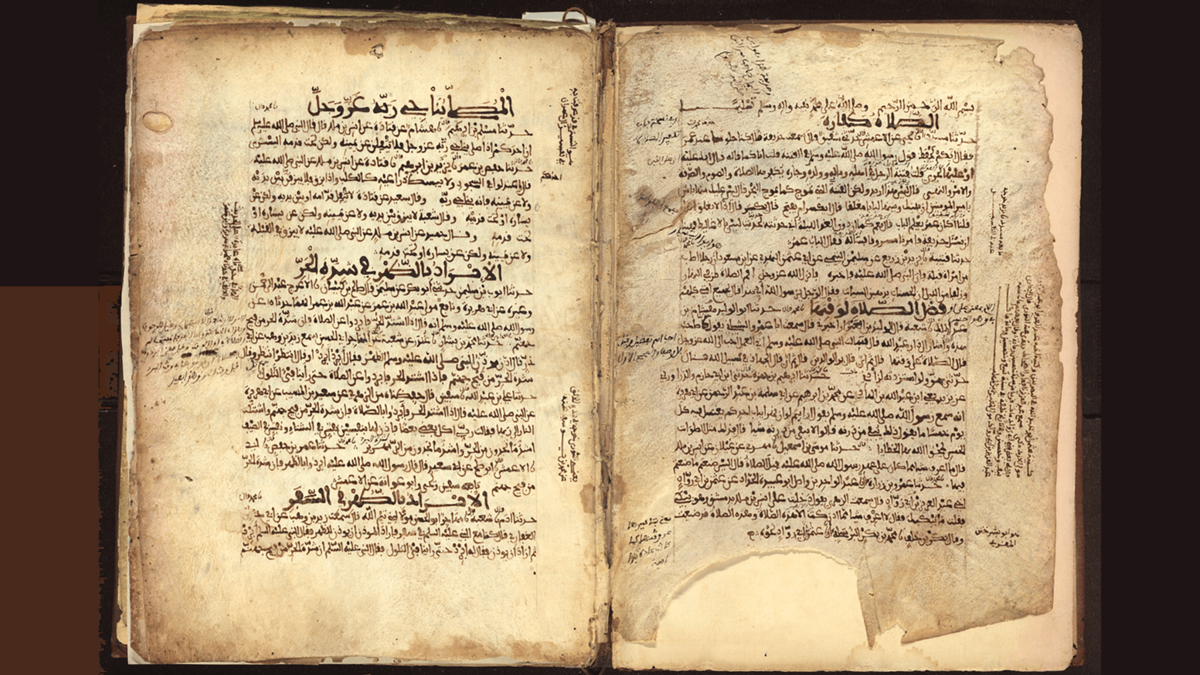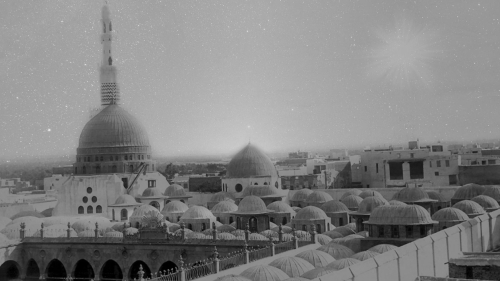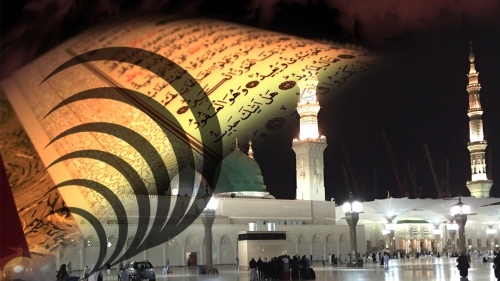Politics of Hadith

A personal story to show the role of hadith
Of all issues in Islamic discourses, few things are as contentious as the role of and use of hadith. While there is no controversy about the revered role of Prophet Muhammad, peace be upon him, and the eagerness of Muslims around the world to follow his guidance, the attempts of Muslims to identify his true example and to apply it correctly are often fraught with difficulties and discord.
A small personal example from one of the authors' childhoods, what he considers the formative years of his belief in love for Prophet Muhammad ﷺ, may help illustrate some of the difficulties alluded to above. He was fifteen years old and had been in the United States for seven years. Along with several friends from his mosque's youth group, he headed for Islamic Youth Camp, a mountain retreat for Muslim youth from across his state. They woke up at the beginning of fajr (pre-dawn) time to say their prayers. They gathered outside on a large lawn in the pitch dark. The temperatures were near freezing, and the wind blew a deep shill into them as they pressed their shoulders together to keep warm. After the recitation of Surah al-Fatiha, the imam began to recite some verses. As his recitation continued for many minutes, the boy could hear the teeth of many of the younger boys chattering from the cold. During what seemed an interminable recitation in the first rak'a alone, some of the children finally began to cry from the pain the cold had begun to inflict upon them. Their crying was easily audible during the prayer. The imam impassively continued his recitation and followed the first rak'a with a similar long torturous second rak'a. At the end of this prayer, the boy angrily approached the imam and asked, "What in the world are you doing? Didn't you hear the children crying from the cold?" He was met with a sneer and now familiar recourse to hadith to defend his action or position, " You should learn your religion," he sharply rebuked the boy. The fajr should be a long prayer. It was the Prophet's habit to recite 100 verses during the first rak'a of fajr and 60 verses during the second, and that's the way fajr will be prayed in this camp." He went on to ask where the boy was from. "Egypt and Los Angeles," he replied. "Well, I am from Mecca al-Mukarrama," he said arrogantly, using this proximity of origin to the Prophet to imply superior knowledge of his sunna (example).
An argument ensued between them - an adult counselor and a fifteen-year-old who refused to believe that this conduct embodied the Prophet's will or example. Ironically, the cold was too bitter for them to stand outside to argue, so they went inside a camp bathroom, with some of the boy's friends listening to the argument. Every time either wanted to quote a verse or a hadith, the entire group would leave the bathroom and go outside, quote a verse or a hadith, and then go back into the bathroom to seek shelter from the cold. This scene of comical insanity was the boy's introduction to the controversies surrounding the use and misuse of hadith. At that age, of course, he was ill-equipped in terms of hadith knowledge to counter the quotes being hurled at him from the textbook Fiqh al-Sunna authored by al-Sayyid Sabiq.
As he grew older and began to read and learn about the Prophet's example, he came to learn that the imam had been right. In the book Fiqh al-Sunna, under the heading of "Recitation in the Morning Prayer," it states: "He [the Prophet, pbuh] would read from 60 to 100 verses during the morning prayer."
Seemingly, though, the imam had forgotten to mention what was written on the next line, "sometimes he would recite surah Qaf, ar-Rum, at-Takwir, or az-Zilzal [al Zalzallah] in the last two rak'a." For reference, these suras contain 45, 60, 29, and 8 verses, respectively. The next line in the discourse continues, "While traveling, he would sometimes read the last two suras of the Quran." These surahs, al-Falaq, and al-Nass have only six and five verses, respectively. In one paragraph above, under the heading "Recitation after al-Fatiha," this same reference states: "Here we shall mention what Ibn al-Qayyim learned about the Prophet's recitation following the Fatiha in different prayers. He commented, When the Prophet finished al-Fatiha, he would sometimes make a lengthy recitation, and sometimes a short one if he was traveling or similarly engaged."
The imam also neglected to tell of a few other relevant hadiths and opinions of the companions. These are quoted in Yusuf al-Qaradawi's book, Al Sahwa al Islamia baina al Juhud wal Tattaruf (The Islamic Resurgence between Unbelief and Extremism). In a chapter heading titled "The Inherent Defects in Religious Extremism," he states about extremism: "It repels people, and is not tolerated by the ordinary human nature...This is why the Prophet became angry with his honored companion Mu'az when he led the people in prayer and prayed too long with them until one of them complained to the Prophet ﷺ. The Prophet told him, ' Are you trying to spread dissension among the people, Mu'az'? He repeated it thrice. This incident is quoted in Bukhari. In a similar incident, he [the Prophet] said to the imam, in a state of unparalleled anger, 'Some of you are repulsive... Whoever of you leads the people in prayer, let him shorten, for there may be behind him someone who is elderly, or weak, or with some need.' Quoted in Bukhari... And Umar [ibn al Khattab], may God be pleased with him, said, Do not make God hateful to his servants, such as when one of you is leading the prayer, and he lengthens the prayer upon the people so that it becomes hateful to them. " 1
The sunna of the Prophet ﷺ, the boy had learned, could be used or misused, quoted wholly or selectively, depending upon the integrity and knowledge of the speaker. This personal example, although trivial, illustrates much of the difficulty Muslims face when dealing with the Prophetic tradition. On the one hand, we all accept the guidance of the Prophet. On the other, his words are sometimes used not in a search for truth but in support of one person or group's conception of what the truth should be.
Note: 1Yusuf al-Qaradawi, Al Sahwa al Islamia baina al Juhud wal Tattaruf (The Islamic Resurgence between Unbelief and Extremism), Umma Books, pp.29-30.
Excerpted from the book "In Pursuit of Justice."
Related Suggestions
Thank you
I have known people that stay away from religious knowledge because this type of situations and misuse of religious knowledge.
Salaam Alaikum
In the New Testament (Bible) of the Christians readers will find a statement about Prophet Jesus. When he was acccused of proclaiming himself as King by his accusers, he is stated in the New Testament(translations, of course) to have said to them, "That is what you say. I am." Many Christians interpret this statement as Jesus's affirmation of himself as Christ/God/Lord and Savior.
Now, for a moment let's ask ourselves, "Is it possible that what Jesus may have said was "That is what you say I am"? Namely, that words have been put in the mouth of Jesus that he may never have said!
Similarly, is it not possible that many, many words are being put in the mouth of Prophet Mohammad that he may never have uttered during his lifetime? And if these statements of the Hadiths are blatantly contradicting the Qur'anic ayat, then the spirital, moral questions that Muslims should ask is: Are we accusing Prophet Mohammad of contradicting and over-riding the verses of Qur'an?
Muslims, wake up from your slumber! Allah SWT expects us all to use our Mind, our Reason and good sense and to be constantly gaining Knowledge about our Deen, not merely parroting the words of past religious scholars.

















